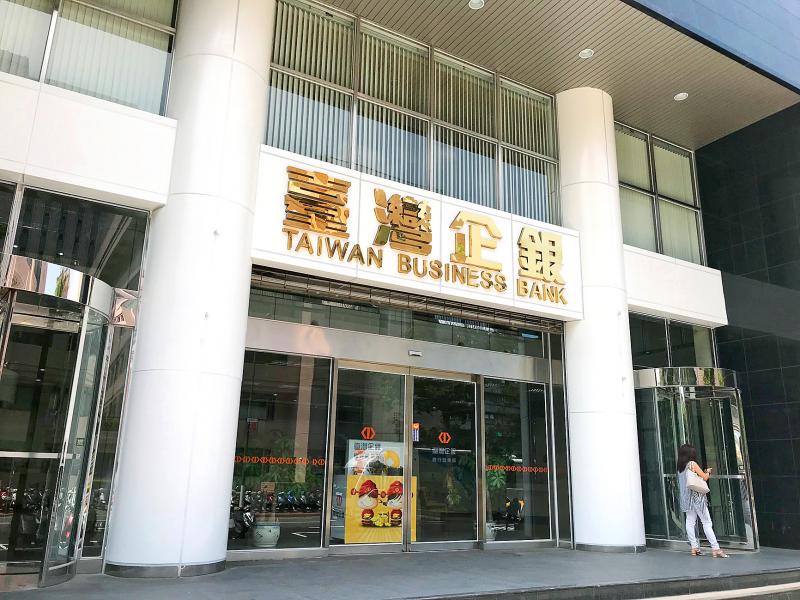Taiwan Business Bank (台灣企銀) yesterday said it is seeking to improve profitability this year by expanding loans to small and medium enterprises (SMEs) and overseas operations as they generate higher margins.
The state-run lender made the announcement after posting NT$2.12 billion (US$72.74 million) in net income for the first quarter — its highest in two-and-a-half years — or earnings per share of NT$0.27.
The lender’s efforts to enhance asset quality and diversify sources of income have started to pay off, bank officials told an online investors’ conference, adding that increases in wealth management and fee income helped offset losses linked to volatile financial markets.

Photo: Chen Mei-ying, Taipei Times
The uptrend is expected to continue for the rest of this year, benefiting from monetary tightening cycles at home and abroad, the officials said.
As of March, lending to small and medium-sized enterprises totaled NT$66.85 billion, an increase of 10.04 percent from a year earlier, they said, adding that the business would continue to provide momentum to loan growth this year.
Interest spread widened from 1.31 percent in March to 1.42 percent last month, following the central bank’s interest rate hike of 25 basis points on March 17, the officials said.
The gap would increase if the central bank raises interest rates later this year, in line with global peers, they added.
Taiwan Business Bank said it would hold mortgage operations steady by focusing on first-home buyers and people with real demand, while supporting selective credit controls on multiple-home mortgages.
Banks intent on active mortgage lending would have to demonstrate higher capital adequacy to meet stricter risk requirements.
Taiwan Business Bank said it would also work toward improving business at its branches in Australia, China, Hong Kong and the US, with the aim of boosting their revenue contributions to 20 percent this year.

South Korea’s equity benchmark yesterday crossed a new milestone just a month after surpassing the once-unthinkable 5,000 mark as surging global memory demand powers the country’s biggest chipmakers. The KOSPI advanced as much as 2.6 percent to a record 6,123, with Samsung Electronics Co and SK Hynix Inc each gaining more than 2 percent. With the benchmark now up 45 percent this year, South Korea’s stock market capitalization has also moved past France’s, following last month’s overtaking of Germany’s. Long overlooked by foreign funds, despite being undervalued, South Korean stocks have now emerged as clear winners in the global market. The so-called “artificial intelligence

NEW IDENTITY: Known for its software, India has expanded into hardware, with its semiconductor industry growing from US$38bn in 2023 to US$45bn to US$50bn India on Saturday inaugurated its first semiconductor assembly and test facility, a milestone in the government’s push to reduce dependence on foreign chipmakers and stake a claim in a sector dominated by China. Indian Prime Minister Narendra Modi opened US firm Micron Technology Inc’s semiconductor assembly, test and packaging unit in his home state of Gujarat, hailing the “dawn of a new era” for India’s technology ambitions. “When young Indians look back in the future, they will see this decade as the turning point in our tech future,” Modi told the event, which was broadcast on his YouTube channel. The plant would convert

‘SEISMIC SHIFT’: The researcher forecast there would be about 1.1 billion mobile shipments this year, down from 1.26 billion the prior year and erasing years of gains The global smartphone market is expected to contract 12.9 percent this year due to the unprecedented memorychip shortage, marking “a crisis like no other,” researcher International Data Corp (IDC) said. The new forecast, a dramatic revision down from earlier estimates, gives the latest accounting of the ongoing memory crunch that is affecting every corner of the electronics industry. The demand for advanced memory to power artificial intelligence (AI) tasks has drained global supply until well into next year and jeopardizes the business model of many smartphone makers. IDC forecast about 1.1 billion mobile shipments this year, down from 1.26 billion the prior

People stand in a Pokemon store in Tokyo on Thursday. One of the world highest-grossing franchises is celebrated its 30th anniversary yesterday.